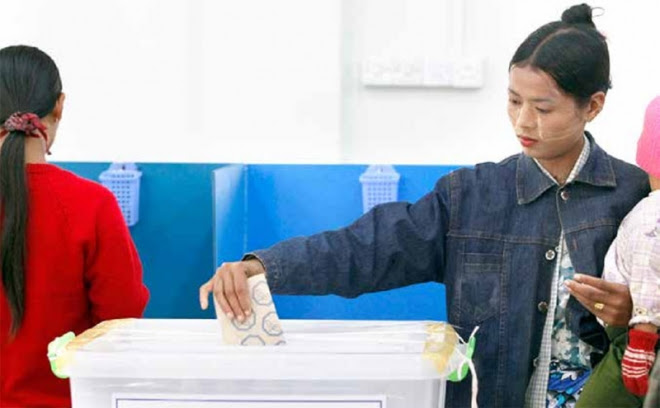The general election due to be held late next year is widely considered to be an important milestone in the transition towards democracy, but there have been some worrying portents.

On 7th September, Union Election commision chairman U Tin Aye announced the cancellation of by-elections originally expected to take place in December. He gave two main reasons for the decision. The first was that he thought it would be a tall order for parties to finance election campaigns in consecutive years. The second was that even if one party won most of the seats it would not effect the balance of power in parliament.
In his monthly radio address on 1st October, President U Thein Sein hinted that the general election in 2015 is not a given. He suggested that the polls might not go ahead unless a national ceasefire has been signed.
In a sense the President’s comments are valid. The most recent incarnation of the peace process has been underway for about three years. Many times a ceasefire agreement has seemed to be within grasping distance, only for new stumbling blocks to emerge. The latest round of talks yielded no results, casting doubt on the ability of the parties to deliver an accord anytime soon.
The signing of a nationwide ceasefire accord would not be the end of it. Some officials have signalled that they want the post-ceasefire political dialogue phase to be completed before the general election as well. If the federalism debates in other countries have yielded any lessons, though, it is that this thorny issue can take years to resolve. For a political solution to be reached more time is needed. Some insiders say it would be unwise to even think of holding a political dialogue with ethnic minority groups during what is likely to be a volatile election campaign.
Reasons for postponing the general election are accumulating.
The ruling Union Solidarity and Development Party seems determined to introduce proportional representation voting in the regions with first-past-the-post in the states, where the USDP expects ethnic minority parties to snatch quite a few seats from the National League for Democracy. International experts say PR would take more than a year to implement.
Another reason why the USDP is likely to favour a postponement is that it is badly positioned, electorally. It is still deeply unpopular and needs more time to produce the tangible results that would give it greater appeal in the electorate. There has been some speculation that the government party might use the Muslim issue to gain an electoral edge, but surveys conducted by the Myanmar Peace Center show that the USDP has little to gain from a campaign based on religious bias.
It is not only that agreement is needed between the ethnic minorities and the government on a national ceasefire. The USDP and the NLD need to come to some kind of an accommodation as well, to avoid a scenario in which a landslide NLD victory could scare the army into launching a coup d’etat. A possibility is that the two parties might propose a government of national unity composed of prominent figures from all political walks of life. For the moment, though, such a scenario remains nothing more than a possibility.
Not all democratic parties are in principle opposed to postponing the general election. Some lack finance, funds and policies and would cherish the opportunity for more time to prepare for the campaign. Other parties, such as the Rakhine Nationalities Party, have criticised the suggestion by the President that the election could be postponed. The nationalistic RNP is confident and strong in Rakhine State. Its deputy leader, U Aye Thar Aung, told the media that delaying the vote would be unconstitutional, because the constitution stipulates that a general election must be held every five years.
But even the constitutional roadblock could be removed by seamlessly including the necessary amendment in the constitution reform process. or perhaps article 399 of the 2008 constitution offers a way out? It allows the Union Election commission to postpone elections in constituencies “due to the local security situation”. Faltering peace talks could be interpreted as creating a national security crisis and provide the basis for a postponement. But this might be stretching the imagination too far.
Perhaps we should not be reading too much at all into the President’s speech and interpret his remarks merely as being intended to pressure those taking part in the peace talks to deliver an accord, or the feast of democracy in which they all hope to participate might be cancelled until further notice.



